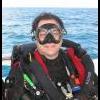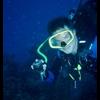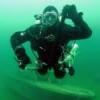
Memorial Day Trip Dive Incident
#1

Posted 02 June 2005 - 10:04 PM
On Memorial Day, everyone geared up for the last dive of the Memorial Day Weekend Trip to South Florida. This trip seemed to be plagued with equipment related problems for our members everyday of the trip. Luckily, there were always people with spare parts, tools and a willingness to help out, allowing everyone to make all of the scheduled dives.
Wreck Wench was, unfortunately, one of these victims, having a regulator that apparently failed early in the trip. As a result of a first stage problem, she was forced to borrow other first stages for her dives, sometimes changing out her second stages to another first stage everyday of the trip.
As a result of repeated changes, and unbeknownst to her, one of her second stage hoses became fatigued where it screws into the first stage. As a side note, this would rarely happen when the hose is not overtightened as it is connected to the first stage. The metal is fairly soft; cranking down the hose is not necessary and can cause the metal to actually break if done frequently enough and hard enough.
On this last day, her hoses were connected to yet another first stage as the dive boat was pulling away from the dock. The regulator was pressurized from the tank in the usual fashion, and everyone in the group did our first dive on the Tenneco Towers, an old oil drilling platform located in about 110 feet of water, off of Southern Broward County.
We exited the water, did a surface interval, and the dive boat took us to our next location, the wrecks of the C-One and the Conception, in Miami-Dade. Because these wrecks were located in only about 70 feet of water, and since WW had a fair amount of gas still left in her tank (and maybe because we always seemed to run short of tanks on this trip), she elected not to change over to a second tank for this dive. Instead, since I was diving with her with my double 120s, which still had plenty of gas in them after our first dive, our dive plan contemplated practicing gas sharing on the dive, using WW's back gas at her discretion.
We entered the water, and we descended to the wreck. Once on the bottom, we exchanged the share gas signal, and WW started to breathe from my seven foot primary hose regulator. We entered the wreck single file, which can be done using the long hose, and started inside the first hallway that would take us inside.
As we negotiated the first doorway inside the hall, WW's regulator bonked (fairly lightly) on the top of the doorway, and there was a loud boom and a large stream of gas was blowing out of WW's first stage. At first, I thought that bonking the regulator unseated the O-ring where the yolk-style regulator connects to the tank valve (this is a big part of the reason that I prefer DIN connections). Whatever the reason, it didn't matter at that point. Bubbles were blasting out of the first stage, hitting the roof of the hallway, and blowing rust and particles all over the place, reducing visibility.
Since WW already had my second stage, there was no need to keep her tank valve open, rapdily exhausting her gas supply. I gave her the signal to stop, and I reached over and closed her tank valve. Rather than rush, possibly complicating matters, we took a minute to settle things down, and we exchanged signals to exit the wreck to assess the situation further. It was then that we found one of her second stages on the floor of the wreck, with the hose broken off at the metal screw that goes into the first stage port. Ahaaah! So, that was the reason for the problem! We then turned the dive, exiting the wreck in single file.
Once outside the wreck, we again stopped, got our equipment in order, and checked my gas supply. There was still over 2,000 psi left in my tanks. I had already been on this wreck many, many times before, and I knew it and the area well. Rather than cut our dive short, we signaled each other to continue the dive, and we explored for about twenty minutes while gas sharing.
When WW needed to add some gas to her wing, I signaled a count down, opened up her tank valve, and she gave her wing a shot of gas. Then, I shut the valve again.
This was not very effective because too much gas was escaping from the open port to also provide much gas to the wing inflator hose. We elected to connect my inflator hose to do the job, and then I re-connected it to my wing after adding her gas. Of course, she could just as easily have orally inflated, but we were having fun and getting in some good practice along the way.
We made our final ascent while gas sharing, and I dropped WW off at the ladder, where she safely exited the water.
You might ask why anyone ever bothers to practice skills during dives instead of just enjoying the dive. It is for occasions like this where practice can make the dive more fun, and might even save a life once in a while. Maybe practicing a gas sharing drill the day before this dive, which I did just for fun, made this dive turn out a whole lot better than it might have if I did not practice so often.
"For the diligent diver, closed circuit rebreathers are actually safer than open circuit scuba." Tom Mount
#2

Posted 02 June 2005 - 10:52 PM
...a very interesting read............. I appreciate your sharing the experience with us. I agree about the skills rehearsals......it's something it wouldn't hurt even for recreational divers to emulate, not just the 'tech' diving community.
...it seems buddy-breathing is something few people ever practice after OW certification...which is a shame.
Like you, where possible, I try to dive with redundant gear......I always dive a dual bladder wing......and some of my single cylinders are fitted with Y-valves, for increased safety ( if I'm not diving my doubles I like to use the Y-valves.)
I always bring at least complete 2 reg sets on ALL my trips........for myself or a fellow diver.........and if I'm diving doubles or Y-valves I'll bring -- 4 -- reg sets.
Karl
#3

Posted 03 June 2005 - 06:32 AM
--Vince Lombardi
#4

Posted 03 June 2005 - 06:58 AM
Once outside the wreck, we again stopped, got our equipment in order, and checked my gas supply. There was still over 2,000 psi left in my tanks. I had already been on this wreck many, many times before, and I knew it and the area well. Rather than cut our dive short, we signaled each other to continue the dive, and we explored for about twenty minutes while gas sharing.
Rather than cut our dive short, we signaled each other to continue the dive, and we explored for about twenty minutes while gas sharing.
Is this some new DIR or NAUI procedure that we haven't heard about? There are so many things wrong with that dive that it's hard to list them all. Insufficient air? Improper dive planning? Improper equipment service, maintenance and inspections? Major equipment failure and continue a dive? It seems like boasting a bit, but shouldn't it rather be written in the tone of what not to do?
What example is that for a dive trip leader and an experienced instructor to novice and less experienced divers? Or any diver for that matter? Just how smart is that? Conventional wisdom says to make a smart, rational and reasonable decision and surface in accordance with everything we've been taught. Ending the dive sure beats the risks associated with the alternative and is much less embarassing than continuing under those circumstances. However, it is an excellent example of what not to do when life support equipment fails.
Edited by RichardB, 03 June 2005 - 07:20 AM.
#5

Posted 03 June 2005 - 07:33 AM
What example is that for a dive trip leader and an experienced instructor to novice and less experienced divers? Or any diver for that matter? Just how smart is that? Conventional wisdom says to make a smart, rational and reasonable decision and surface in accordance with everything we've been taught. Ending the dive sure beats the risks associated with the alternative and is much less embarassing than continuing under those circumstances. However, it is an excellent example of what not to do when life support equipment fails.
Have to agree here. All I'll say is--major learning experience. Thanks for the post Scubadad.
#6

Posted 03 June 2005 - 08:30 AM
#7

Posted 03 June 2005 - 08:34 AM
What example is that for a dive trip leader and an experienced instructor to novice and less experienced divers?
While true, keep in mind, none of us are perfect and sometimes we all make bad choices. The important point is to not repeat those mistakes. While I consider myself an extremely safe diver, I've made poor choices when I had more dive experience than Kamala does currently that make this dive sound like a walk in the part. On one dive in particular, I wasn't sure I was coming back. It was the result of making poor choices. I am much more careful in my choices as a result.
DSSW,
WWW™
#8

Posted 03 June 2005 - 08:51 AM
While true, keep in mind, none of us are perfect and sometimes we all make bad choices. The important point is to not repeat those mistakes. While I consider myself an extremely safe diver, I've made poor choices when I had more dive experience than Kamala does currently that make this dive sound like a walk in the part. On one dive in particular, I wasn't sure I was coming back. It was the result of making poor choices. I am much more careful in my choices as a result.
Well said. I've had a few of those experiences, too and certainly learned a lot because of them. As the saying goes, "Experience is a dear school, but a fool will learn in no other." (I'm not calling anyone a fool here). Like you say, we've all made poor choices. Actually, making a thread on those--everybody sharing those bad experiences would be a good thing to do.
#9

Posted 03 June 2005 - 09:04 AM
Once she no longer had her own gas (at least without blowing most of it out of her first stage), I am sorry to say it was time for that thumb. Practicing a gas share is one thing. Relying on it when you don't need to (ie. not still inside the overhead and basically at the ascent line)... that is quite another. The minute that one diver is dependent, it is time to go. Going inside that wreck was not advised.
All I have to say is that I have equally crazy things and they are lessons in what not to do when I reflect and walk away. They say that the Lord protects fools and drunks. One days like that, I am not a drunk so that leaves one option for at least that dive.
#10

Posted 03 June 2005 - 09:14 AM
.[/b][/i]
Is this some new DIR or NAUI procedure that we haven't heard about? There are so many things wrong with that dive that it's hard to list them all. Insufficient air? Improper dive planning? Improper equipment service, maintenance and inspections? Major equipment failure and continue a dive? It seems like boasting a bit, but shouldn't it rather be written in the tone of what not to do?
What example is that for a dive trip leader and an experienced instructor to novice and less experienced divers? Or any diver for that matter? Just how smart is that? Conventional wisdom says to make a smart, rational and reasonable decision and surface in accordance with everything we've been taught. Ending the dive sure beats the risks associated with the alternative and is much less embarassing than continuing under those circumstances. However, it is an excellent example of what not to do when life support equipment fails.
This is definitely not DIR... Maybe it is DI-WR(wrong), but not DIR. Even ignoring DIR, I agree there are too many things wrong with this dive to go into each one... but continuing a dive that can be aborted once WW's gas supply was compromised is not even questionable. It is a MUST to abort in this situation. That was an appropriate time to "thumb" the dive. If you had a stage bottle to hand to the "out of air" buddy, a case might be made otherwise... but in this case... I see no arguement at all for continuing that dive... (of course, I only know what was written). Sorry, and I hate the "SCUBA POLICE"... but it had to be said!
The post does illustrate how important it also is to have proper equipment configuration when diving just about anything other than open water. Standard open water configurations are not well suited to any penetration diving and many "specialty certifications" may not adequately address this issue either. Streamlining is extremely important in diving, but absolutely critical in wreck or cave penetration or anywhere subject to entanglement.
Glad you all made it back alive... and I am sure you felt there was no real danger involved with your dive... I have one less friend because of ignored protocol... and I'm very sure he thought his deviation from accepted protocol would be ok in that particular instance too. Otherwise, he would not have gotten into the water.
Putting my soap box away now...
ITB...
Actually, the WORST day of diving is better than the BEST day at work...
and... my life is not measured by the number of breaths I take, but by the number of breaths I take UNDER WATER
"I see you are no stranger to pain." -- "I was married... TWICE!!!" HOT SHOTS, PART DEUX
#11

Posted 03 June 2005 - 09:27 AM
Planning a dive including air sharing when a full air supply is available on both divers is not a problem. It is good protocol for reaffirming the ability to do so should the need arise. Doing it during penetration... well, we do it in cave training... and wreck training.... but an instructor (cave or wreck) is close at hand. Doing it on a penetration dive when one or both divers may have less air than could be considered safe...? If both divers have full cylinders... this practice is ok. When starting a dive with less??? Not so. If the doubles had an air emergency problem that totally eliminated them from the air supply(although unlikely), Kamala's air is the redundancy for the doubles... once Kamala's back-up ability was eliminated, the dive should be thumbed. This is a good lesson for us all and we should not repeat this mistake.We learn from our mistakes. I know I've learned lots of lessons from mine. I think it would have been wise to not plan a dive around sharing air, especially one involving penetration. I also think it would have been wise to abort the dive immediately (although you were correct not to rush) when the regulator failed.
What example is that for a dive trip leader and an experienced instructor to novice and less experienced divers?
While true, keep in mind, none of us are perfect and sometimes we all make bad choices. The important point is to not repeat those mistakes. While I consider myself an extremely safe diver, I've made poor choices when I had more dive experience than Kamala does currently that make this dive sound like a walk in the part. On one dive in particular, I wasn't sure I was coming back. It was the result of making poor choices. I am much more careful in my choices as a result.
Actually, the WORST day of diving is better than the BEST day at work...
and... my life is not measured by the number of breaths I take, but by the number of breaths I take UNDER WATER
"I see you are no stranger to pain." -- "I was married... TWICE!!!" HOT SHOTS, PART DEUX
#12

Posted 03 June 2005 - 09:31 AM
There's a difference between mistakes or poor decisions, and (apparently) intentionally incompetent and knowingly wrong decisions. The nature of this situation is compounded considering the particular responsibilities, experience and credentials of the divers in question.
Diving is a very safe and enjoyable sport when the rules are followed and we adhere to our training. When these requirements are cast aside for any reason......mistake, incompetence or intentional arrogance......SCUBA is a relentlessly unforgiving mistress.
In this vein, the leaders among our diving community have an inherent (and often professional) obligation to go above and beyond in not only stressing safe practices but also in demonstrating the same. Leaders have an obligation to guide toward proper paths, not to show detours into hazardous and reckless behaviors.
#13

Posted 03 June 2005 - 09:48 AM
He did not get out... (under his own power)...I have one less friend because of ignored protocol... and I'm very sure he thought his deviation from accepted protocol would be ok in that particular instance too. Otherwise, he would not have gotten into the water.
He is now in the "hereafter"... in case that wasn't clear! Some mistakes, poor decisions, etc... are fatal. We owe it to our loved ones and those that look up to us... if not to ourselves... to "DO IT RIGHT"!
ITB...
(I'm putting the soap box away for good now.... maybe!)
Actually, the WORST day of diving is better than the BEST day at work...
and... my life is not measured by the number of breaths I take, but by the number of breaths I take UNDER WATER
"I see you are no stranger to pain." -- "I was married... TWICE!!!" HOT SHOTS, PART DEUX
#14

Posted 03 June 2005 - 10:21 AM
"Love is blind but lust likes lacy panties" -- SanDiegoCarol
"If you're gonna be dumb, you'd better be tough." -- Phillip Manor
"If I know the answer I'll tell you the answer, and if I don't I'll just respond cleverly." -- Donald Rumsfeld
#15

Posted 03 June 2005 - 11:20 AM
A couple of things to put into perspective here. WW can normally carry out a dive to this depth with the amount of gas in her cylinder at the time to the tune of well beyond the planned dive time when we started the dive. To say that one should carry out additional dives with only full cylinders makes no sense. After all, my cylinders weren't full after the first dive, either. Am I to carry multiple sets of doubles so that I can make sure to carry out additional dives with full tanks at the start everytime? Of course not. One only need plan the dive based on the gas carried, which we did. Second, this was a planned dive that involved gas sharing. It was not necessary but was done to provide an even greater margin of comfort of gas supply for both divers.
At no time were we in mandatory decompression. So, even if there had been total gas failures for both divers on all cylinders a regulators (pretty darn unlikely), our average depth was about 60 feet or just above on this dive. We could, in that unlikely event, have done a swimming ascent to the surface. Not a first choice, but one that remained open.
I had double cylinders with redundant regulators and an isolator. In short, there were plenty of regulators and gas to go around. Additionally, I had a 40 cubic foot cylinder of oxygen with me. I would only have had to get to 20 feet from about 60 to start to use that.
The dive was turned the second the incident happened. We did not continue a wreck penetration dive after it happened. Once we were in open water, I do not think that a diver with over 800 dives and another one with over 2,000 dives should have much of a concern about gas sharing in open water at this depth and under these conditions.
It would have taken about two minutes of just leaving the valve opened for the gas to drain from WW's cylinder. This is still plenty of gas to get to the surface safely in the event of all other gas supplies also failing. This could be extended significantly by working the valve opened and closed for breathing the gas. This, of course, is not ideal. However, this was not an out of gas situation here.
Given the circumstances, I would do this again without question. This was a knowing decision on my part, and I feel comfortable with it. You are entitled to disagree and to carry out your dives in any way you see fit.
"For the diligent diver, closed circuit rebreathers are actually safer than open circuit scuba." Tom Mount
0 user(s) are reading this topic
0 members, 0 guests, 0 anonymous users



















